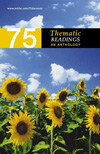
Anna Quindlen |  |
Anna QuindlenAnna Quindlen, "Evan's Two Moms" Anna Quindlen (1953- ) was born in Philadelphia and earned a B.A. from
Barnard College in 1974. She's worked as a reporter for The New York
Post and The New York Times, and as a columnist for the latter
paper. Quindlen writes novels including One True Thing (1994),
which was made into a successful movie in 1998, and Black and Blue
(1998). She also contributes frequently to periodicals such as The
Writer, Good Housekeeping, American Health for Women,
and Newsweek. Using an accessible style, she often writes about
family issues, and much of her work carries a strong emotional charge.
Quindlen won the Pulitzer Prize in 1992 for her commentary in the New
York Times. "Evan's Two Moms," a look at same-sex marriage,
was first published in 1992 in the New York Times and collected
in Quindlen's Thinking Out Loud (1993). | QUESTIONS FOR DISCUSSION | CONTENT - What jobs do Evan's two moms hold?
- What, according to the author, is "the linchpin of family"?
- According to Quindlen, how do gay people and straight people differ
on the notion of gay marriage?
- Describe the circular argument the author mentions in paragraph
six.
- Describe the case of Loving v. Virginia.
- What are some of the financial disadvantages same-sex couples face
compared to mixed-sex couples?
STRATEGY AND STYLE - At the end of paragraph one, the author employs a series of fragments.
How does this usage reflect her feelings about family?
- What is Quindlen's argument here? Outline her main points and types
of support for each in as much detail as you can.
- Quindlen points out an irony in paragraph seven. What is it? How
does this irony illuminate her discussion of gay marriage?
- Take a look at the examples the author provides in paragraph five.
The last one is different from the others. How does it differ and why
do you think the author included it? What would change about the tone
of the paragraph without this last example?
| ENGAGING THE TEXT | - Describe your relationship with your mother. How can you relate
this relationship to your reading?
- How important is your sex to your self-image? How might your self-image
change if your sex changed? How might these feelings have affected your
reading?
| SUGGESTIONS FOR SUSTAINED WRITING | - Quindlen discusses how a situation with "emotional truth"
can change when it becomes a legal matter. Pick another situation—a
couple living together who decide to get married, a married couple living
apart who decide to make their separation legal, or something else you
come up with—and write an essay exploring the impact of the legal upon
the emotional.
- At the end of her essay the author suggests that love and commitment
form the basis of a good marriage. Do people always get married with
these things in mind? What other reasons might lead people to marriage?
Do you have any problem with the notion that gay people might want to
get married for different reasons that straight people do?
| FOR FURTHER RESEARCH | Do some research to find out how attitudes about same-sex marriage have
changed, if at all, since this piece was written in 1992. If they have,
has this change in attitude been reflected in the law? If they haven't,
should attitudes change? Explain. How did your research deepen your understanding
of the issues presented in this essay? | WEB CONNECTION | Did you know that Quindlen has been a contributor to the movies? Here
is a movie
review of One True Thing. Have you seen it? After reading this
review, do you want to? Explain. | LINKS | Biographical This is a brief
bio of Quindlen with some links from Online-Library.org. How comfortable
would you be using some of the information here in a paper about this
author? Explain your answer. Here is her profile
from a lecture agent. Compare the information here with that from the
page mentioned above. What appears on this page that the other page
doesn't pay much attention to? Interested in this author's personal history? Here Quindlen
explains how she came to love books. How does she relate reading and
writing? How do you?
Bibliographical This is an excerpt
from A Short Guide to a Happy Life. Take a look at the accompanying
photographs. Describe them in as much detail as you can. How do they
complement the text? Hungry for some multimedia featuring this author? This page
has links to a video clip, an audio clip, and the transcript of an interview
Quindlen did promoting her book Thinking Out Loud. Here is the commencement
address she gave at Mount Holyoke College in 1999. What is the theme
of her speech? What does Quindlen have to say about learning? What does
she have to say about being happy?
Cultural This is the citation
for her Pulitzer Prize. Do you recognize any of the other authors on
this page? How would you go about getting some information about them? This is a review
of her book Black and Blue. Can you tell what the novel is about
from this review? What kinds of questions can you ask yourself about
it that only the book itself can answer?
|
|
|
|